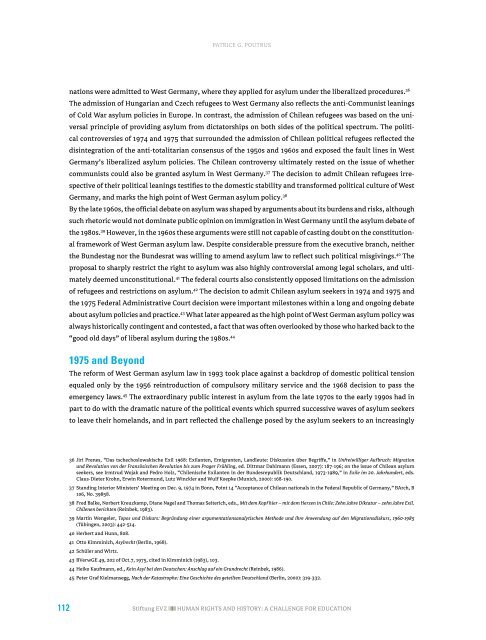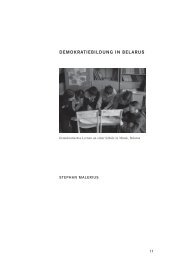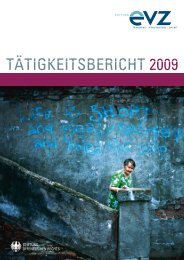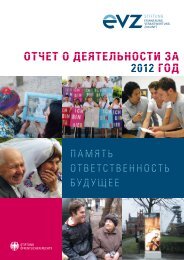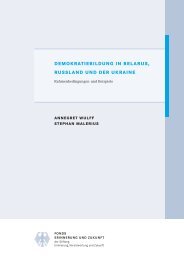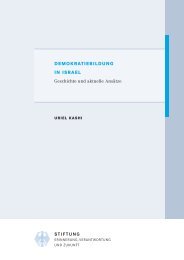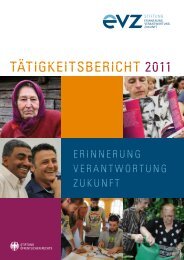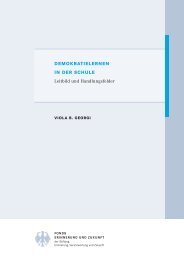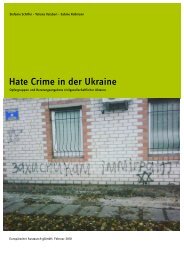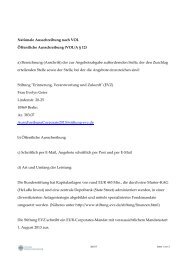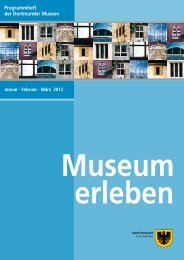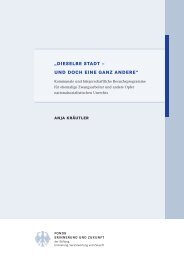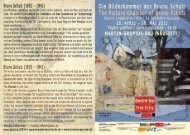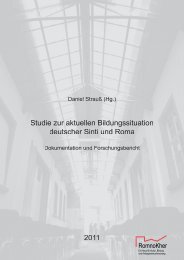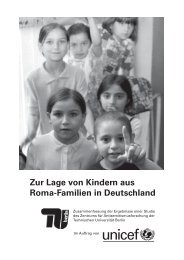chapter 2 - Stiftung "Erinnerung, Verantwortung und Zukunft"
chapter 2 - Stiftung "Erinnerung, Verantwortung und Zukunft"
chapter 2 - Stiftung "Erinnerung, Verantwortung und Zukunft"
You also want an ePaper? Increase the reach of your titles
YUMPU automatically turns print PDFs into web optimized ePapers that Google loves.
Patrice G. Poutrus<br />
nations were admitted to West Germany, where they applied for asylum <strong>und</strong>er the liberalized procedures. 36<br />
The admission of Hungarian and Czech refugees to West Germany also reflects the anti-Communist leanings<br />
of Cold War asylum policies in Europe. In contrast, the admission of Chilean refugees was based on the universal<br />
principle of providing asylum from dictatorships on both sides of the political spectrum. The political<br />
controversies of 1974 and 1975 that surro<strong>und</strong>ed the admission of Chilean political refugees reflected the<br />
disintegration of the anti-totalitarian consensus of the 1950s and 1960s and exposed the fault lines in West<br />
Germany’s liberalized asylum policies. The Chilean controversy ultimately rested on the issue of whether<br />
communists could also be granted asylum in West Germany. 37 The decision to admit Chilean refugees irrespective<br />
of their political leanings testifies to the domestic stability and transformed political culture of West<br />
Germany, and marks the high point of West German asylum policy. 38<br />
By the late 1960s, the official debate on asylum was shaped by arguments about its burdens and risks, although<br />
such rhetoric would not dominate public opinion on immigration in West Germany until the asylum debate of<br />
the 1980s. 39 However, in the 1960s these arguments were still not capable of casting doubt on the constitutional<br />
framework of West German asylum law. Despite considerable pressure from the executive branch, neither<br />
the B<strong>und</strong>estag nor the B<strong>und</strong>esrat was willing to amend asylum law to reflect such political misgivings. 40 The<br />
proposal to sharply restrict the right to asylum was also highly controversial among legal scholars, and ultimately<br />
deemed unconstitutional. 41 The federal courts also consistently opposed limitations on the admission<br />
of refugees and restrictions on asylum. 42 The decision to admit Chilean asylum seekers in 1974 and 1975 and<br />
the 1975 Federal Administrative Court decision were important milestones within a long and ongoing debate<br />
about asylum policies and practice. 43 What later appeared as the high point of West German asylum policy was<br />
always historically contingent and contested, a fact that was often overlooked by those who harked back to the<br />
“good old days” of liberal asylum during the 1980s. 44<br />
1975 and Beyond<br />
The reform of West German asylum law in 1993 took place against a backdrop of domestic political tension<br />
equaled only by the 1956 reintroduction of compulsory military service and the 1968 decision to pass the<br />
emergency laws. 45 The extraordinary public interest in asylum from the late 1970s to the early 1990s had in<br />
part to do with the dramatic nature of the political events which spurred successive waves of asylum seekers<br />
to leave their homelands, and in part reflected the challenge posed by the asylum seekers to an increasingly<br />
36 Jiri Prenes, “Das tschechoslowakische Exil 1968: Exilanten, Emigranten, Landleute: Diskussion über Begriffe,” in Unfreiwilliger Aufbruch: Migration<br />
<strong>und</strong> Revolution von der Französischen Revolution bis zum Prager Frühling, ed. Dittmar Dahlmann (Essen, 2007): 187-196; on the issue of Chilean asylum<br />
seekers, see Irmtrud Wojak and Pedro Holz, “Chilenische Exilanten in der B<strong>und</strong>esrepublik Deutschland, 1973-1989,” in Exile im 20. Jahrh<strong>und</strong>ert, eds.<br />
Claus-Dieter Krohn, Erwin Roterm<strong>und</strong>, Lutz Winckler and Wulf Koepke (Munich, 2000): 168-190.<br />
37 Standing Interior Ministers’ Meeting on Dec. 9, 1974 in Bonn, Point 14 “Acceptance of Chilean nationals in the Federal Republic of Germany,” BArch, B<br />
106, No. 39858.<br />
38 Fred Balke, Norbert Kreuzkamp, Diane Nagel and Thomas Seiterich, eds., Mit dem Kopf hier – mit dem Herzen in Chile: Zehn Jahre Diktatur – zehn Jahre Exil.<br />
Chilenen berichten (Reinbek, 1983).<br />
39 Martin Wengeler, Topos <strong>und</strong> Diskurs: Begründung einer argumentationsanalytischen Methode <strong>und</strong> ihre Anwendung auf den Migrationsdiskurs, 1960-1985<br />
(Tübingen, 2003): 442-514.<br />
40 Herbert and Hunn, 808.<br />
41 Otto Kimminich, Asylrecht (Berlin, 1968).<br />
42 Schüler and Wirtz.<br />
43 BVerwGE 49, 202 of Oct.7, 1975, cited in Kimminich (1983), 103.<br />
44 Heiko Kaufmann, ed., Kein Asyl bei den Deutschen: Anschlag auf ein Gr<strong>und</strong>recht (Reinbek, 1986).<br />
45 Peter Graf Kielmansegg, Nach der Katastrophe: Eine Geschichte des geteilten Deutschland (Berlin, 2000): 319-332.<br />
112<br />
<strong>Stiftung</strong> EVZ<br />
HUMAN RIGHTS AND HISTORY: A CHALLENGE FOR EDUCATION


